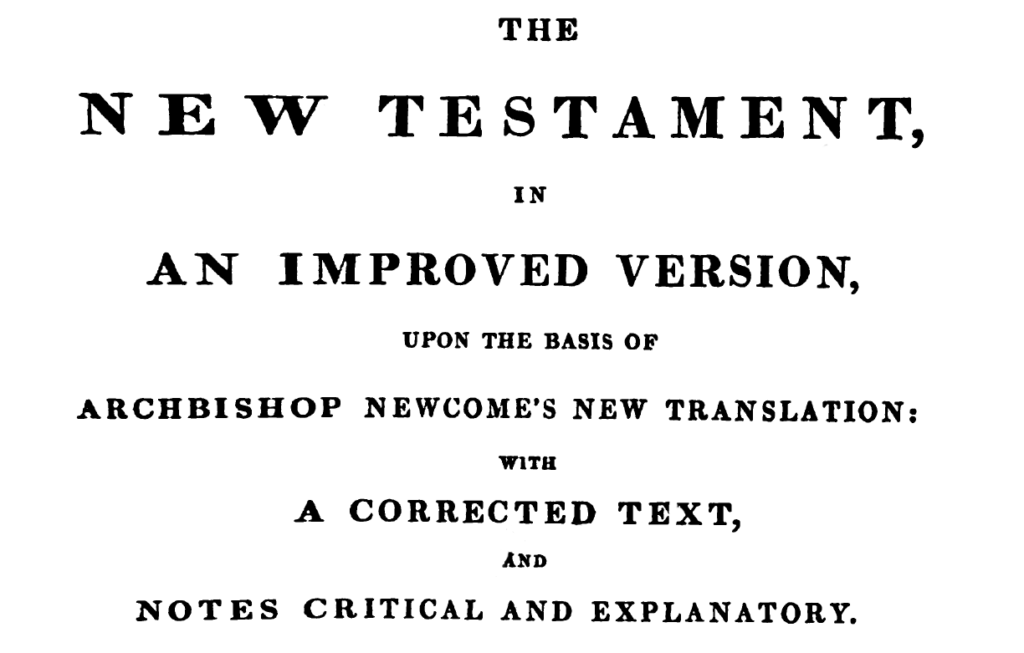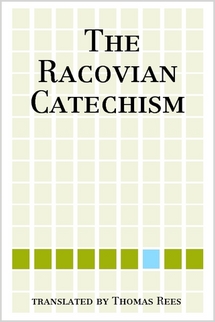Podcast: Play in new window | Download
Subscribe: Spotify | Email | RSS

In this episode we’ll explore the sort of interpretation of John 1 where “the beginning” in question was in the first century, and on which “the Word” is the man Jesus Christ.
Pioneered by the radical reformation Protestants known as the Polish Socinians, this sort of interpretation was adopted in the 17th-19th centuries by some English-speaking unitarian Christians.
We’ll hear the translation and exposition of the prologue to John in the 1817 4th ed. of what is basically a unitarian “Study Bible” edition of the New Testament.
We’ll also hear some discussion of John 1 from the 1680 version of the famous Racovian Catechism, as translated into English by Thomas Rees in 1818. These two sources are perhaps the most famous expositions of this sort of Jesus-centered approach to John 1.
Are you convinced? Why or why not?
Links for this episode:
- Philippians 2:5-11; John 1:1-18; 1 John 1:1-4; John 20:28; Romans 9:5; Hebrews 1:8-9; Romans 1:3; John 1:15; Mark 1:1.
- a reading of Philippians 2:5-11
- Clarifying Catholic Christologies
- The Racovian Catechism
- The New Testament in An Improved Version, 4th ed. (1817)
- Improved Version: John 1
- Improved Version: 1 John 1:1-4
- Debate – Dr. Dale Tuggy vs. Chris Date “Is Jesus Human and not Divine?”
- podcast 224 – Biblical Words for God and for his Son Part 1 – God and “God” in the Bible
- podcast 225 – Biblical Words for God and for his Son Part 2 – Old “Lord” vs. New “Lord”
- podcast 226 – Biblical Words for God and for his Son Part 3 – post-biblical uses of biblical words, and new words
- This week’s thinking music is “Just a Blip” by Andy G. Cohen.


A few points for the traditional reading of John 1 as reference to Genenesis 1:1 creation:
• The creative word said to be “with God” appears throughout the OT, e.g., Ps 33.6 in the LXX “the breath of his mouth” = “the word of the Lord” = “the spirit….God said,” Genesis 1:2-3 ff.; cp. Heb 11.3
• The divine passives “was/were created” in John 1:3-4, 10.
Lastly, it’s a translators bias to render logos as “a god” in John 1:1. It assumes the “word” is a separate, distinct Person apart from God. The anarthrous noun (theos) is used for the Father everywhere else.
Many modern-day grammarians like Moulton, Wallace et al have successfully argued from the Koine Greek grammar that the noun theos in John 1:1 expresses quality, i.e., “godlike” or “divine.” Many translators interpret the logos as expressive of God Himself:
“God was what the Word was.”
Unvarnished NT; NT: An Understandable Version (WE Paul 1994)
“what God was the word was.”
New English Bible; Revised English Bible (‘89)
“And God was the Logos.“
Today’s English NT (Klingensmith)
“the Word was God Himself.”
Amplified Bible (1965 & 1987 update); A Translation in the Language of the People (Williams); Original Aramaic NT in Plain English
“God was that Word.”
Ancient Eastern Manuscripts (Lamsa); NT Coptic Version
“The Divine word and wisdom was there with God, and it was what God was.”
Scholars Version (The Five Gospels), 1993; The Complete Gospels: Annotated Scholars Version (1992)
Hello Carlos. Interesting that the Improved Version notes has both readings, while preferring the Socinian.
There is a massive clue to the meaning of John 1 ff. prior to the opening verse – the title of the book. A gospel is a book of the acts of a king. The Gospel according to John is about the acts of His Majesty, the Lord Jesus, so, when it says, “in the beginning”, it is self-evidently speaking of the beginning of his acts. It is possible that such a book could start with creation, but one would expect this to be pointed out, since that would be an unexpected twist.
Dear Dr. Tuggy, many thanks for the stirling work you have put in on these podcasts. I have been listening for a few weeks now, and have hugely benefited. The last two have been especially interesting. It is good to know that there are differing readings of John 1 from what is, to me, a new perspective. I place a high value on grammatical-historical exegesis, and I could kick myself for having missed so many obvious steps. For example, the verb in verse three, ginomai, which is not “made”. Then there is the basic step of checking in other places with the same author for the meanings of initially unexplained terms like, “the beginning”, instead of simply making an unchecked assumption. It demonstrates the power of a settled mindset – one that you are unaware of in yourself! We truly need the insights of others in the church to help us out of these invisible mental manacles. Again, many thanks.
Are you receiving this?
It’s good to see this kind of approach to the Prologue finally being reconsidered for discussion among biblical unitarians.
As Andrew Perry indicated in the previous podcast, some of us have come to similar conclusions about the translation and interpretation of the Prologue in this generation without knowing anything about the writings of the the Socinians.
Understanding that the human being, Jesus Christ, is the one called “the Word” in John 1:1 is the direction that biblical unitarians need to be going. I’m glad that Dale Tuggy found some “scholars” that make him feel more comfortable about taking a look at the exegetical evidence.
Comments are closed.